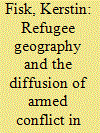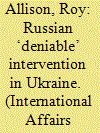| Srl | Item |
| 1 |
ID:
134516


|
|
|
|
|
| Summary/Abstract |
Does domestic political unrest deter foreign direct investment (FDI)? And what are the longer term impacts of unrest upon the market? Most theories suggest that investors are deterred by unrest. However, empirical research returns only marginal support. We argue that these mixed results stem from the conflation of the distinct tactics and outcomes of political unrest. Violent forms of unrest increase uncertainty and risk. By comparison, nonviolent forms of unrest are shown to more frequently achieve their goals and increase the prospects for democratic change and market stability. In addition, investors avoid markets where campaigns have ended in failure, defined as the campaign not achieving their stated political aims. Failed campaigns often precipitate a cycle of unrest that create greater uncertainty over the long-term stability of a state. We find strong evidence in favor of our propositions, even after taking political motivation and non-random selection into account.
|
|
|
|
|
|
|
|
|
|
|
|
|
|
|
|
| 2 |
ID:
134522


|
|
|
|
|
| Summary/Abstract |
When does domestic unrest lead to interstate conflict? I present the diversionary target theory that argues that domestically troubled states are more likely to use military force against some, but not all, states because political leaders prefer targets that can evoke their domestic audience's fear or greed in order to enjoy “rally-round-the-flag” effects. I suggest that the fear-producing targets are foreign states that exhibit rapidly rising power or manifest different identities. The greed-producing targets are foreign states occupying disputed territory or exercising regional/local hegemony despite declining power. In addition, I expect that political leaders prefer fear- or greed-producing targets that possess similar powers, because domestic audiences may see initiation of military conflicts against too-powerful states or too-weak states as excessively risky and unnecessary, respectively. From statistical analyses on directed dyad-years from 1920 to 2001, I find that the presence of a rising power, a territory target, or a hegemony target contributes to the correlation between domestic unrest and the initiation of interstate conflict in a statistically significant way.
|
|
|
|
|
|
|
|
|
|
|
|
|
|
|
|
| 3 |
ID:
136153


|
|
|
|
|
| Summary/Abstract |
One year on from the widespread protests in Turkey, the question of why small environmental protests against the building of a shopping mall on Gezi Park in the centre of Istanbul turned into the biggest example of mass civil movement in the republic's history remains unanswered. This article suggests that one can easily detect signs of instability and social unrest in the country long before these mass demonstrations took place. By analysing the evolution of the Turkish party system over the past decade, I argue that the political upheaval in the country is the result of a crisis of representation. This has two aspects: a high degree of polarisation has left certain segments of society unrepresented, while the AKP government has ceased to maintain the balance between responsiveness and responsibility.
|
|
|
|
|
|
|
|
|
|
|
|
|
|
|
|
| 4 |
ID:
135751


|
|
|
|
|
| Summary/Abstract |
The northwestern Chinese region of Xinjiang is experiencing ongoing violent unrest but remains an economic gateway to Eurasia. Sarah Lain examines China’s policy to improve security and economic cooperation with its central Asian neighbours.
|
|
|
|
|
|
|
|
|
|
|
|
|
|
|
|
| 5 |
ID:
136015


|
|
|
|
|
| Summary/Abstract |
Talks to discover the whereabouts of Japanese citizens abducted by North Korea have stalled, despite Tokyo’s diplomatic overtures. Sarah McDowall examines whether Pyongyang is using the issues to gain political and economic concessions from Japan.
|
|
|
|
|
|
|
|
|
|
|
|
|
|
|
|
| 6 |
ID:
135705


|
|
|
|
|
| Summary/Abstract |
The Egyptian energy crisis has already driven discontent and civil unrest, feeding into former president Mohammed Morsi’s ouster by the army in July 2013
|
|
|
|
|
|
|
|
|
|
|
|
|
|
|
|
| 7 |
ID:
136090


|
|
|
|
|
| Summary/Abstract |
Why are refugee populations associated with the spread of conflict? Do refugees upset local dynamics by increasing the mobilization opportunities of rebels? Work on rebel motivation predicts that the strategic impact of a location influences armed actors' decisions to fight there; thus, I identify two strategic aspects of refugee geography which may influence where conflict takes place in the host country – refugee mass and refugee accommodation type. I examine the influence of these factors using a new, disaggregated dataset on refugees in 26 African countries engaged in armed conflict during the period 2000–2010.
|
|
|
|
|
|
|
|
|
|
|
|
|
|
|
|
| 8 |
ID:
135866


|
|
|
|
|
| Summary/Abstract |
The Russian military interventions in Ukraine, which have led to the annexation of the Crimean peninsula and to the entrenchment of separatist enclaves in Donetsk and Luhansk provinces, directly challenge the post-Cold War European state system. Russia has consistently denied any wrongdoing or illegal military involvement and has presented its policies as a reaction to the repression of ethnic Russians and Russian speakers. This article argues that it is important to examine and contest unfounded Russian legal and political claims used by Moscow to justify its interventions. The article proceeds to assess in detail three different explanations of the Russian operations in Ukraine: geopolitical competition and structural power (including the strategic benefits of seizing Crimea); identity and ideational factors; and the search for domestic political consolidation in Russia. These have all played a role, although the role of identity appears the least convincing in explaining the timing and scope of Russian encroachments on Ukrainian territorial integrity and the disruption of Ukrainian statehood.
|
|
|
|
|
|
|
|
|
|
|
|
|
|
|
|
| 9 |
ID:
134454


|
|
|
|
|
| Summary/Abstract |
Faced with the possibility of losing their position due to domestic opposition, political leaders may sometimes consider initiating a foreign conflict as a means to redirect attention away from domestic issues. In such instances, which states are most likely to become diversionary targets? This study assumes that unpopular leaders prefer small-scale conflicts that can create rally-round-the-flag effects without triggering substantial domestic opposition to the use of military force abroad. Based on this assumption, hypotheses are developed which predict that states under constraint (i.e. states with democratic institutions or showing high trade openness) tend to attract diversionary-motivated actions, while states likely to reciprocate harshly (i.e. states experiencing their own domestic troubles or in relative decline) are less likely to become diversionary targets. Logit analyses of directed dyad-years from 1960 to 2001 and illustrations of marginal effects provide strong support for three of the four hypotheses – namely, that democracies and trading states are more likely, and that declining powers are less likely to be targets of diversionary actions. This study’s findings show that not all potential targets are equally attractive for diversionary actions, and that a state’s democratization, economic openness, and power growth can worsen, rather than improve, its security.
|
|
|
|
|
|
|
|
|
|
|
|
|
|
|
|